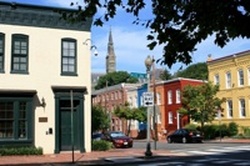|
Two days before world leaders converged to Marrakech for the U.N. climate summit, a smaller and cozier meeting took place in Washington, DC with a shared interest in, and concern for, humanity’s relationship with the rest of nature. The meeting was the first conference for graduate students that Georgetown University hosted on world environmental history, titled: “Humanity & Other Forms of Life: Environmental Histories of the World.” The conference took place at the Mortara Center for International Studies on a cold Saturday (November 5) and featured the work of students from eight universities (Cornell, Georgetown, Indiana, NYU, Ohio State, Princeton, Stony Brook, and Yale). Environmental history graduate students at Georgetown organized the event with generous support from the Georgetown Institute for Global History, the Graduate School of Arts and Sciences, the Provost Office, and the Mortara Center. Doctoral candidate Faisal Husain masterminded the day’s events, supported by several students and faculty members. It was a polished, friendly conference that covered an impressive range of topics with grace and thematic cohesion. The first panel covered waterscapes in nineteenth century British-controlled Bengal, the Ottoman Empire, and Great Lakes region during the early twentieth century. All three papers explored the ways in which changing aquatic environments affect how the people living in those watersheds relate to their governments, and vice versa. They also touched on themes of sovereignty and knowledge creation in interesting ways. In recent years, the environmental history of military conflict has grown and deepened. The second panel, “Terrains of Medieval Warfare” showed new ways that the sub-field can be expanded. The papers, covering three different continents and ambitious time scales, were thoughtful treatments of how military leaders used their surroundings to obstruct enemies, control civilian populations, and supervise conquered spaces. The third panel was entirely modern, and as geographically diverse as the others. The panelists’ work examined ways in which technological sophistication changed states’ attempts to control animals, crops and even people, with careful analysis of the language and cultural discourse of control and government. In recent years, the environmental history of military conflict has grown and deepened. Over the course of the weekend, faculty reflected on the presented research as panelists, commentators, and in informal conversations. Comments from Professors De Luna and McNeill presented a central tension of the historians’ mission: balancing the need to place our specific research in a broad enough context that others can see its relevance, and the need to include all the people and natural phenomena that shape events, not only the literate, easily-accessible actors. Or, in its most basic form, the juggling of “So, what?” and “What of . . .?” They agreed that researchers should strive to find a ‘sweet spot’ that encompasses a portrait of human and non-human experience that is as detailed and accurate as possible, without abandoning the challenges of working with larger time- and space scales and of placing lived experience in broad context. Professors Degroot and Newfield shared useful anecdotes and advice about how to find and work effectively with scientists, a process they both described as difficult but ultimately rewarding. For example, Prof. Degroot encouraged students to submit papers to science conference and attend them to form personal connections. He noted that historians can help scientists understand how their data are meaningful in broader a social context. Prof. Newfield noted that contacting the lead authors of recent publication on a given subject is often a good way to find possible collaborators. They recommended exploring sciencedirect.com and the NSF’s REU program, which gives students the opportunity to try scientific research firsthand. The experience of these two professors and the panelists’ research led to some thought-provoking discussions of methodology, particularly the rise of integrated STS/HS/EH (Science and Technology Studies/History of Science/Environmental History) scholarship, and the challenges (and possibilities) of combining natural proxy data with documentary evidence. Students also took the opportunity to quiz Environmental History editor Prof. Lisa Brady about journals, publishing and her new research into the environmental history of modern warfare in the Korean Peninsula. She noted that her editorial work has reinforced her conviction that every piece of writing needs multiple revisions. For doctoral students thinking about submitting journal articles, she provided the following tips:
In this quick overview of our first student-run conference, we’ve tried to include details of those parts of the discussions that might be useful to fellow graduate students. Feel free to get in touch with us by email or social media if you’re interested in following up with any of the participants, or making your own conference!
1 Comment
|
EH@G BlogArticles written by students and faculty in environmental history at Georgetown University. Archives
May 2020
Categories |


 RSS Feed
RSS Feed